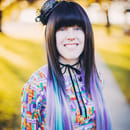If you don’t want to accidentally offend your queer best friend, it’s good to know some of the most common mistakes allies make in conversation. You may not even realize that what you’re saying is hurtful or offensive, and once you’re aware, it makes it that much easier to be a supportive friend.
1. “I know another gay/lesbian/bisexual person who you can date.”
The dating pool may be smaller for queer people, but that doesn’t mean we need you to set us up with the only other queer person you know.
Instead, straight friends should engage their queer friends in the same conversations they would anyone else. If they genuinely know someone who is single and their type, it’s not unreasonable to ask if they’d be interested in meeting. In general, though, you should just work on getting to know whether your queer friend has any current crushes, and what kind of person they find irresistible.
“As a straight ally, if you’re in a relationship, you wanna talk about it,” says Heather Hogan, a senior editor at AutoStraddle. “If you’re not in a relationship, you probably wanna talk about crushes or people you’d like to date. Ask your queer friends the same questions you’d ask your straight friends.”
Lucy Hallowell, a writer for AfterEllen, echoes that sentiment. “Are they dating anyone?” she suggests asking. “How is that going? Are they single? Then maybe ask if they are trying to meet someone or if they are happy being solo right now.”
If you know if your queer friend is looking to find someone, that can help you set your expectations when you meet another single person who may be their type, but just don’t assume that your friend will necessarily go for it.
Related: 10 Things You Should Never Say to an LGBTQ+ Individual
2. “Can you help me pick out an outfit?”
Stereotyping your friends based on their sexuality is never okay, but it can seem harmless enough if you’re asking a gay guy, for example, to help you go shopping. However, unless you know your friend well enough to know that they adore shopping with you, it can really make people feel pressured to perform a role.
“Sometimes, my female friends assume they can ask me for fashion advice just because I’m gay,” says Sam Finch, a freshman at Amherst College. “But I’m really not into fashion or shopping. I’d rather be asked for dating advice, because that’s something I know more about.” Nobody wants to be reduced to a simple stereotype, so try to remember that even if your friend seems like they may fit the bill, it might still be better to ask what they actually want to do when you hang out.
“When you tap into one of those stereotypes, you’re also tapping into really damaging stereotypes that have been around a really long time,” says Hogan. She adds, “You’re kind of shutting yourself down from having really satisfying friendships.” By assuming that your queer friend fits neatly in a role, you’re really just cheating yourself out of a deeper, richer friendship with them that’s not based on stereotypes.
3. “I could never date another woman/man, because…”
This sentence is often finished off with a stereotype, such as “I could never date another woman because it would be so dramatic all the time,” “I couldn’t date another man because nobody would express their feelings” or something to that effect. “You should always steer clear of that kind of language,” Hogan says. “There’s some internalized sexism in those kinds of comments.”
The opposite can also be harmful, if people make assumptions about how a same-sex relationship works based on gender stereotypes. “I’ve had friends tell me that they think it would be great to be gay,” says Ashley DeCania, a senior at Rollins College. “They think that it would be like being with your best friend all the time, and that a girl couldn’t hurt them the way a guy could.”
Comments like these reinforce sexist stereotypes that there are only two genders, and that each gender behaves in a specific way. By saying this, you’re also invalidating the fact that same-sex couples have just as many issues as straight couples, including problems with communicating, regardless of gender.
4. “The opposite gender sucks, maybe I’ll turn gay too.”
The same can be said for saying something along the lines of, “I can’t find a good boyfriend/girlfriend, I wish I was gay!” or implying that life would be easier if you were queer.
This is problematic for several reasons. One is that it reinforces gender stereotypes, and erases the experiences of transgender people. Comments like these essentially equate people’s genitalia with a gender identity, and along with it, specific roles and stereotypes such as, “Men are cheaters, but women don’t cheat.”
And although there are definitely people who choose to be queer, there are also still plenty of queer people who are severely oppressed for coming out. “[Saying this] really invalidates the painful experience that people go through to be authentic,” Hogan explains.
Straight friends usually do mean to be supportive with this comment, though. They’re essentially saying that they accept queerness to the extent that if it were possible, they’d also be happy to be queer. Instead of making comments like these, supportive straight allies can take a page out of the book of Hanna Marin from Pretty Little Liars, and make it clear that it doesn’t matter if their best friend dates men, women, transgender or genderqueer people, both or all genders, or nobody at all. They love their friend unconditionally.
5. “If I were queer, I would totally date you.”
As sweet as this may come across, it also has the potential to make it seem like the only reason you aren’t dating is because of your sexuality—as if your queer friend may have feelings for you.
There’s this assumption that “The only thing keeping women from dating each other is if one of them isn’t gay,” according to Hogan, which is damaging because queer people don’t have feelings for everyone of a certain gender. Queer people have diverse preferences, just like straight people.
“It’s weird to ask if your friend thinks you’re hot or if she has a crush on you,” Hallowell agrees. “If you’re a woman, would you ask that of your straight male friends? Probably not.” As annoying as it is for outsiders to assume a straight girl and straight guy who are best friends are actually dating, it’s just as annoying for a queer person to feel like the only thing keeping the two of you apart is your sexuality.
If you want to know more about what your queer friend is feeling, be honest and just let them know that you care and want to support them, and that they can always tell you if you’re saying something hurtful. We all make mistakes, even queer people, and your friend will be happy that you took the time to show how much you care. Being a supportive ally and friend is usually as simple as treating your queer friends the same way you treat your straight friends.


